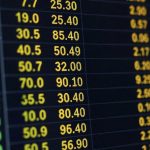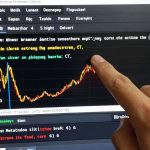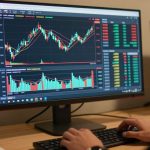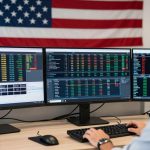Robinhood is expanding into Europe with blockchain-based systems to enable 24/7, low-cost trading of US stocks for retail investors. This move aligns with pro-crypto policies in the US, aiming to democratise stock trading. The company’s success depends on its blockchain infrastructure choice and building trust with European investors as regulations evolve, paving the way for global growth.

Robinhood, the well-known American brokerage platform, is making bold moves to transform the landscape of stock trading in Europe. By exploring the potential of blockchain technology, the company aims to revolutionise access to US stocks for retail investors across the continent. This innovative approach promises to offer cost-effective, 24/7, cross-border trading of US equities, setting the stage for a significant shift in how European investors engage with the stock market.
The adoption of blockchain systems is poised to redefine the way retail investors interact with stock markets. Robinhood’s expansion into Europe leverages blockchain to offer several benefits that traditional financial markets cannot match, such as fractional ownership of high-priced shares and continuous access to the market. This is expected to significantly lower the entry barriers for retail investors, providing them with more flexibility and control over their investments.
Blockchain technology, and in particular Distributed Ledger Technology (DLT), is predicted to bring immense cost savings to the financial system. According to the Global Financial Markets Association, DLT could save the global financial industry up to $20 billion annually in settlement and delivery costs.
The Regulatory Shift and the Role of Blockchain
The timing of Robinhood’s European push comes at a crucial moment, with regulatory landscapes in the US shifting towards a more crypto-friendly approach. The US Securities and Exchange Commission (SEC), under the leadership of Chairman Paul Atkins, has unveiled an ambitious pro-crypto policy agenda. These changes aim to simplify compliance for tokenised asset platforms like Robinhood, paving the way for their global expansion.
As Osama Bari, CTO of D24 Fintech Group, notes, “Robinhood’s European expansion signals the beginning of a global race to democratise stock trading. However, much depends on execution, particularly its choice of blockchain infrastructure and the ability to navigate both investor sentiment and evolving regulations.”
Choosing the Right Blockchain Infrastructure
One of the key decisions facing Robinhood is the choice between Solana and Arbitrum as the foundation for its blockchain-based stock trading system. Both platforms have their advantages and challenges.
- Solana: Known for its speed and low transaction fees, Solana is an attractive option for high-frequency trading. Its robust DeFi and NFT ecosystem further strengthens its appeal. However, Solana has experienced past stability issues, which may raise concerns for its use in financial applications.
- Arbitrum: On the other hand, Arbitrum brings Ethereum’s well-established security and ecosystem, making it a strong contender. While it offers greater security, its transaction speed and fee efficiency still lag behind Solana.
Bari highlights, “The choice between Solana and Arbitrum is a critical decision. While Solana offers higher speed and lower fees, Arbitrum benefits from Ethereum’s security but falls behind in transaction efficiency.”
Building Trust with European Investors
While the technological foundations are important, Robinhood’s success in Europe will also hinge on building trust with local investors. Many European retail investors are still unfamiliar with blockchain-based equities, and regulatory frameworks for tokenised securities remain in flux. However, the proactive stance taken by the SEC in clarifying rules surrounding token securities, self-custody rights, and unified crypto-securities platforms is expected to reduce the legal risks for platforms like Robinhood.
A Global Opportunity for Robinhood
Robinhood’s European expansion is not merely about accessing a new market; it represents a strategic move that could set the precedent for blockchain-based trading worldwide. If successful, Robinhood could lead the way in tokenising US stocks, influencing how both retail and institutional investors access capital markets.
Bari concludes, “If Robinhood succeeds, it sets a precedent for blockchain in Europe and beyond. The company could lead the way in a market where even institutional giants like BlackRock and VanEck are already rolling out blockchain-based funds. Ultimately, the question is not if retail investing will move to the blockchain—but when.”
As blockchain technology matures and regulatory environments evolve, the future of stock trading is set to become more accessible, transparent, and democratic. Robinhood’s European push could be the first step in a broader, global movement towards tokenised equity trading, offering significant benefits for both investors and the financial system at large.
About D24 Fintech Group
D24 Fintech Group is a global leader in developing innovative technological solutions for the evolving fintech and digital landscapes. The company is dedicated to enhancing transactional security, streamlining digital payments, and improving operational efficiency. Through its affiliates, D24 operates in over 100 countries, creating an interconnected ecosystem for digital finance. Its solutions include advanced technological platforms, incubation services, and more, designed to set new industry standards and drive innovation in the fintech space.
Himani Verma is a seasoned content writer and SEO expert, with experience in digital media. She has held various senior writing positions at enterprises like CloudTDMS (Synthetic Data Factory), Barrownz Group, and ATZA. Himani has also been Editorial Writer at Hindustan Time, a leading Indian English language news platform. She excels in content creation, proofreading, and editing, ensuring that every piece is polished and impactful. Her expertise in crafting SEO-friendly content for multiple verticals of businesses, including technology, healthcare, finance, sports, innovation, and more.








